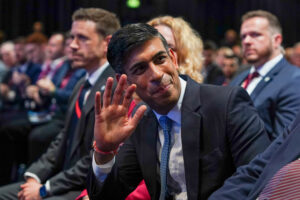“I was not really in Manchester at all,” wrote J.B. Priestley after spending a few days in the city for the opening of a play in the early Thirties. “I was living in a private nightmare city, bounded in space by the Palace Theatre and the Midland Hotel.” This is largely how I felt at Conservative Party Conference this week: bounded in space between the absurd theatre on show inside the conference centre on one side and the ghastly reality of the Midland Hotel bar on the other, a sweaty scrum of lobbyists, hacks and wannabe Jacob Rees-Moggs competing for attention. Oh how I wish party conferences were scrapped entirely — and not just for my sanity, but for the health of the country.
It’s not just that party conferences have become grim experiences inaccessible to the ordinary person, devoid of any real energy or free thought. They are also tawdry symbols for the state of the nation itself, great fraudulent towers of bullshit designed to look good from the outside. At best, they are empty of any real substance; at worst, they are actively harmful to the country itself.
Consider three of the most prominent policies that shaped this gathering: HS2, Net Zero, and an end to A Levels. Each is a serious structural reform, sold as the policy of a serious man doing serious work. And yet each is a personal whim, the latest preference of the latest inhabitant in No. 10. It is an absurd way to run a country.
On HS2, Sunak has summarily executed a policy included in three consecutive Conservative manifestos, passed into law by a Conservative parliament, and backed by Sunak himself in his leadership campaign. And while scrapping a project of this magnitude with the stroke of a pen might well bring tangible savings, it also brings intangible costs. Anyone who has piled money into Birmingham or Manchester based on the assumption that HS2 would be built — as agreed in law — has been shafted. As for the wider population, why should anyone believe anything the Government says? The only rational assumption is to assume it, and the British state more generally, will go back on its word. A raft of new train lines and road improvements in its place? Pie in the sky.
And with only a year to go before an election that the Labour Party is expected to win, Sunak has promised a complete overhaul of the A-Level system. We have had 10 education secretaries in the past 13 years; we’ve had free schools under Michael Gove; exam results have changed from letters to numbers; and three years ago we got the “T Level” which yesterday was axed. Exactly the kind of swerving “trolley” government Boris Johnson’s removal was supposed to end.
The absurdity of this policy switcheroo has nothing on Net Zero, however. Here is the most revolutionary economic policy in at least a generation, something which will affect almost every aspect of our lives. And how was it approved? By statutory instrument with almost no debate. Many MPs who support Net Zero will privately admit that the way it was introduced was outrageous. Sunak last month criticised the way the policy was enacted “without any meaningful democratic debate about how we get there”. And yet yesterday he delivered one prime ministerial decree after another, all of which the voters must take on trust that he will deliver — even though similarly radical plans promised by all his predecessors often amounted to nothing.
There is an obvious presidentialism to Sunak in his governing style and technocratic confidence. Yet he is better understood as our first management consultant prime minister, utterly convinced of his own rational superiority and common sense. Look at the language he used in his conference speech: “I concluded it simply was not right”; “I am changing all of that”; “I am cancelling the rest of the project.” The man from Goldman Sachs looked at the books and made a decision — and we are all supposed to accept that this is how we are governed.
The Party’s dizzying number of about-turns over the past few years is not without consequence. Within the party, the different factions are now openly challenging each other for control of its future direction, aware that they are only ever one leader away from another sudden change.
Behind closed doors in Manchester, Tory MPs were in open disagreement about the direction the party needed to go. Was it for free markets or economic nationalism, staying in the ECHR or scrapping it, small-state libertarianism or old Tory moralism? More than that, few seemed able to agree on what story they had to tell of the past 13 years. Was it all part of three decades of cosy political consensus and failure, as Sunak suggested in his speech; one long era of Blairite supremacy, as some in the party now grumble? This, in effect, was the line Ed Miliband and Jeremy Corbyn once told of New Labour in reverse: a period of calamitous Thatcherite continuity. That didn’t work out so well. What seems clear from the feel of the conference and the tenor of Sunak’s speech is that we are heading towards a more robustly Thatcherite party in the truest sense: outwardly conservative on social issues, immigration and national sovereignty. And yet it also remains the party that left one part of the country under EU law.
It is hard not to feel cynical about the whole spectacle. What do all these conferences and prime ministerial declarations amount to? Within hours of his first — and potentially last — leader’s speech to conference, it turned out that Sunak’s education reforms are unlikely to amount to anything for a decade and that some of the great “Network North” to replace HS2 was either in the south or already built.
Away from Sunak’s Silicon Valley-syle unveiling, the big picture of the past 13 years is not that he is some great figure of revolution, but a cheap emblem of the entire era, just the latest in a long line to pull back the ambitions of the state being able to do anything. Sunak is the great reflection of the structural problems of our governing class and the grand economic challenges it is struggling to overcome.
Just look at the record: under Cameron, the country was promised a “Northern Powerhouse” with mass electrification of the rail network across the north. Under May, much of this was scrapped — to George Osborne’s fury. Then, under Johnson, we got levelling-up instead of the Northern Powerhouse, with government departments dotted across the Red Wall to no discernable strategic purpose or any great depth of support in the party. When Johnson went, so too did levelling up, a policy all but ignored by Truss whose own plans were quickly crushed by a national fragility she could not comprehend (and still can’t). Now, we have Sunak, who has rolled back Cameron’s grand promises even further — to make room for a whole series of new ones which will not happen.
For 13 years, Conservative Party leaders have traipsed up to one party conference after another attempting to spin the reality away: that we are a poor country where everything is expensive. At every turn, with each new PM, they have succeeded only in making things worse, deluded about their own unique wisdom, power and ability to shape the environment in which we operate. They promised national sovereignty and put a border down the Irish Sea; to reduce immigration only to let it double; and to stop the “chaos” threatened by Labour only to then turn around after 13 years and say they haven’t managed to change anything. Sunak has enough energy and arrogance to cause real problems for Labour over the next year or so and should not be ruled out politically. But that does not change the fact that, rather than challenge Britain’s state failure, his government by decree epitomises its worst excesses.
Britain has somehow contrived to produce a system with too much political power concentrated in a centre which is too weak to do anything meaningful with it. Walking around Manchester this week was a grim reminder of this paradoxical reality; the British state both distant and impotent; the city’s successes its own, but its future in someone else’s hands. “There was a time when Manchester was known as the ‘home of living causes’,” wrote Priestley back in 1934. “Exactly what living causes are finding a home there now I do not know.” The same seems true today. Outside of the South East, Manchester is the home of Britain’s great hope of economic success. Maybe it is also where it goes to die.
Disclaimer
Some of the posts we share are controversial and we do not necessarily agree with them in the whole extend. Sometimes we agree with the content or part of it but we do not agree with the narration or language. Nevertheless we find them somehow interesting, valuable and/or informative or we share them, because we strongly believe in freedom of speech, free press and journalism. We strongly encourage you to have a critical approach to all the content, do your own research and analysis to build your own opinion.
We would be glad to have your feedback.
Source: UnHerd Read the original article here: https://unherd.com/




